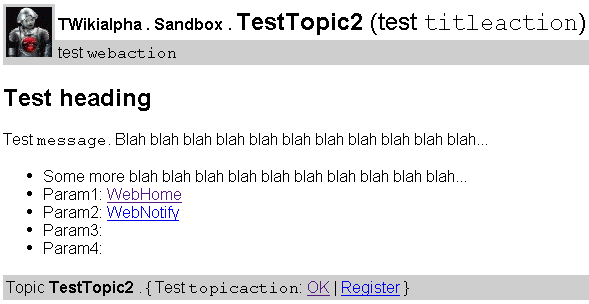&TWiki::Store::readTemplate() so that the caller simply gets an expanded template file (the same as before).
%TMPL:<key>% and %TMPL:<key>{"attr"}%.
-
%TMPL:INCLUDE{"file"}%: Includes a template file. The template directory of the current web is searched first, then the templates root (twiki/templates). -
%TMPL:DEF{"var"}%: Define a variable. Text between this and the END directive is not returned, but put into a hash for later use. -
%TMPL:END%: Ends variable definition. -
%TMPL:P{"var"}%: Prints a previously defined variable.
twiki.tmpl master template, like twiki.print.tmpl, that redefines the header and footer.
